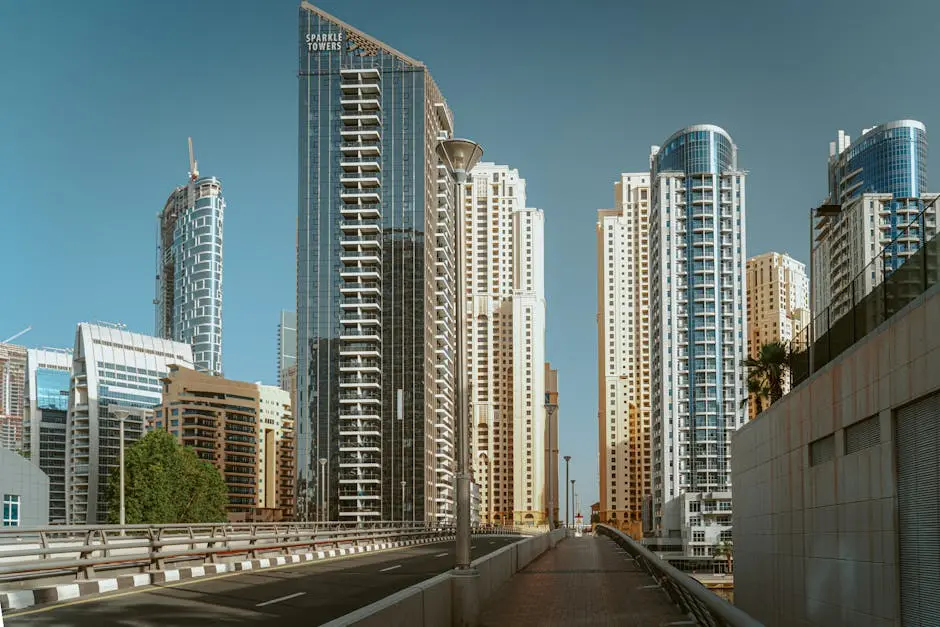Dubai is known for its luxurious lifestyle, towering skyscrapers, and vibrant culture. However, beneath the glitz and glamour lies a complex legal framework governing property ownership and real estate transactions. This blog highlights essential aspects of Dubai property law that may surprise new investors and residents. Whether you’re considering investing in property or simply curious about the rules that dictate this dynamic market, these facts will enlighten you.
1. Foreign Ownership Options
In Dubai, foreign investors can purchase property in designated freehold areas, allowing full ownership rights that are rare in many countries. This feature attracts a wide range of international buyers seeking to capitalize on the emirate’s booming real estate market. However, understanding the zones where foreign ownership is permitted—such as Dubai Marina, Jumeirah Lake Towers, and Downtown Dubai—is essential. Each of these areas has its own unique offerings and lifestyle benefits that could suit various preferences.
Moreover, while acquiring property, foreign investors should also be aware of the local customs and regulations that govern property transactions. These include fees associated with purchase and registration that can impact your overall investment budget. Such fees typically encompass the Dubai Land Department fees, registration costs, and real estate agent commissions. Failing to consider these financial obligations can lead to unexpected expenses.
2. The Role of Title Deeds
Title deeds in Dubai not only prove ownership but also contain important details that outline property boundaries and rights. This legal document is vital for both buyers and sellers, serving as an official record of property transactions. A title deed includes information such as the owner’s name, the property’s location, and any existing liens or encumbrances. Understanding the information within title deeds can prevent future disputes and ensure that your property rights are well protected.
It’s worth noting that the Dubai Land Department has implemented digital initiatives to streamline the issuance and management of title deeds. This innovation not only enhances transparency but also speeds up the entire process, a notable advantage for investors keen on swift transactions. By leveraging technology, the department aims to simplify real estate procedures, which is particularly beneficial for first-time buyers.
3. Impact of Sharia Law
Sharia law influences property inheritance in Dubai, especially for Muslim owners, which can differ significantly from Western legal systems. Under Sharia, property is typically inherited by family members based on fixed shares, and there are specific guidelines regarding how ownership is transferred upon death.
While a non-Muslim foreigner can fully own property in designated freehold areas and distribute assets through a registered will, Muslim property owners may be subject to Sharia inheritance rules unless alternative arrangements are made.
This distinction highlights the importance of understanding Dubai’s property laws for different demographics. Non-Muslim expatriates can draft wills through the DIFC Wills Service Centre or Dubai Courts to ensure their assets are distributed according to their wishes. Regularly updating these wills based on personal circumstances can help safeguard property interests, making legal clarity a top priority for investors.
4. Rental Law Insights
Dubai’s rental laws include specific regulations around tenancy contracts, tenant rights, and eviction processes that aim to protect both landlords and tenants. These laws are designed to create a balanced relationship between parties, ensuring fair treatment during lease agreements. For example, tenants cannot be evicted without just cause, and landlords must provide proper notice for termination of lease agreements.
Furthermore, the Dubai Rental Dispute Settlement Centre offers a structured legal recourse for any disputes arising from rental agreements. This agency plays a crucial role in resolving conflicts, reinforcing the legal framework intended to uphold the rights of both landlords and tenants. Familiarity with these laws is essential for anyone entering the rental market, as it provides clarity and confidence in your rights and obligations.
5. Off-Plan Purchase Regulations
Investing in off-plan properties in Dubai offers certain benefits but also comes with its own set of legal protections to safeguard buyers. These properties, often still under construction, provide investors with the opportunity to secure a property at a lower price before it is completed. However, it is critical to understand the regulations surrounding off-plan purchases, which are designed to protect buyers from potential risks related to project delays or developer defaults.
A significant protection mechanism is the requirement for developers to obtain pre-launch approvals from RERA. These approvals ensure that the developer has the necessary rights and finances to complete the project as promised. Buyers should also review the payment plan and ensure that it aligns with construction milestones to safeguard their investment. Understanding these layers of protection can greatly enhance your confidence in off-plan property investments.
6. Community Service Charges
Homeowners in Dubai are required to pay service charges that contribute to community maintenance, which are outlined in the property agreements. These charges cover various amenities and services such as security, landscaping, and general upkeep of common areas. While these fees are essential for maintaining a desirable living environment, they can vary significantly from one community to another.
It’s advisable for potential buyers to inquire about the service charge history before making a purchase decision. These charges can influence your monthly budget, and unexpected increases can lead to financial strain. Transparency from developers regarding service charges is important so homeowners can make informed decisions about their investments.
7. Understanding Mortgage Laws
Mortgage laws in Dubai have specific stipulations for both UAE nationals and expatriates, including down payment percentages and loan terms. Typically, expatriates may face stricter borrowing conditions compared to locals. While UAE nationals can access financing for up to 80% of the property value, expatriates usually can borrow around 75%.
In addition to down payment requirements, borrowers should also familiarize themselves with the various types of mortgages available in Dubai. Options include fixed-rate and variable-rate mortgages, each with its own benefits and risks. Understanding these differences can help you choose a product that aligns with your financial situation and long-term property ownership goals.
8. The Importance of No Objection Certificates
No objection certificates (NOCs) are crucial when selling or transferring property in Dubai, ensuring that there are no financial or legal issues. These documents are issued by the developer or the relevant authorities and serve to confirm that all dues have been settled, making them an essential part of the transaction process. Without an NOC, the transfer of ownership cannot be completed, which can lead to delays or complications.
Additionally, the process of obtaining an NOC may vary depending on the nature of the property or community regulations. Therefore, buyers and sellers should be proactive in ensuring that all necessary documentation is in order before initiating a transaction. This diligence can save time and prevent unnecessary legal hurdles down the line, empowering you to navigate the Dubai property market with confidence.
9. Real Estate Regulatory Agency’s Role
The Real Estate Regulatory Agency (RERA) oversees property transactions in Dubai, ensuring that laws are followed and providing guidance for investors. Its role is pivotal in maintaining market integrity, protecting consumer rights, and ensuring transparency within the industry. RERA operates various systems, including online platforms, where investors can verify developer licenses and ownership status.
Furthermore, RERA actively engages in educating investors about their rights and obligations within the real estate market. They also promote best practices among developers, which contributes to a healthier investment environment. Taking advantage of the resources and support available through RERA can significantly positively impact your property experience in Dubai.
10. Cultural Considerations in Property Deals
Cultural nuances play a significant role in property transactions in Dubai, affecting negotiation styles and contract terms. Understanding the local customs can facilitate smoother dealings and foster better relationships with stakeholders. For instance, negotiating a property price may involve more than just numbers; it often demands an understanding of the buyer’s and seller’s backgrounds and expectations.
In addition, the language barrier can also pose challenges. Employing discussions in both Arabic and English can demonstrate respect for local customs and enhance communication. By recognizing and adapting to cultural differences, investors can achieve better outcomes while navigating the complexities of Dubai’s vibrant property market.
11. Virtual Property Management Systems
Technological advancements have led to the rise of virtual property management systems, streamlining transactions and enhancing transparency. These innovative platforms allow investors to manage properties remotely, facilitating seamless communication and data sharing. Features such as digital lease agreements, online payment options, and maintenance tracking can significantly improve the rental management experience.
Moreover, employing such technologies fosters better accountability among property managers. Investors can track expenses, review service histories, and engage with tenants more effectively. This modernization within the real estate sector not only boosts operational efficiencies but also aligns with Dubai’s vision of becoming a smart city, making it essential for tech-savvy investors.
12. Investment Schemes and Incentives
Dubai offers various investment schemes and incentives, including residency visas for property investors, to attract foreign capital. This initiative has been a game-changer, enabling expatriates to secure long-term residency in exchange for property investment, thus making the UAE an appealing destination for global investors.
In addition to residency benefits, investors may also find enticing return on investment opportunities, particularly in well-located projects that cater to both locals and tourists. The continuously growing demand for housing and commercial properties signals a robust market, prompting many to consider Dubai as an ideal place for property investment.
13. Legal Recourse for Disputes
In case of disputes, Dubai has a structured legal framework to resolve property-related issues, ensuring that both parties can seek justice. This comprehensive system is designed to facilitate fair hearings and enforce rulings, whether it involves rental disagreements, ownership disputes, or contractual issues.
Understanding the paths for legal recourse gives investors confidence when entering the market. Various stakeholders should familiarize themselves with the roles of both RERA and the Dubai Courts System, as these entities play a critical role in upholding laws and providing resolutions in property-related disputes.
14. Environmental Regulations Impacting Properties
Environmental regulations in Dubai affect property development and ownership, focusing on sustainability and ecological impact. As the city progresses towards becoming more environmentally conscious, developers are required to adhere to guidelines that promote eco-friendly practices.
These regulations may influence the types of materials used in construction, energy consumption, and waste management practices. Moreover, properties that meet sustainability standards often see increased value and demand from the environmentally-conscious market segment. Understanding these regulations can not only enhance the appeal of a property but also ensure compliance as Dubai evolves toward greener initiatives.
15. Changing Landscape of Dubai Property Law
As Dubai evolves, its property laws are continually adapting, reflecting changing market dynamics and international investment trends. This constant transformation affects all stakeholders, including developers, investors, and residents, underscoring the need for ongoing education and awareness regarding property laws.
Keeping abreast of these changes is essential for anyone involved in the real estate sector. Whether through regular updates from RERA or participating in real estate workshops, being informed will provide a competitive edge in this fast-paced market. Just as Dubai’s skyline continues to change, so too will its property laws, making adaptability crucial for success.

